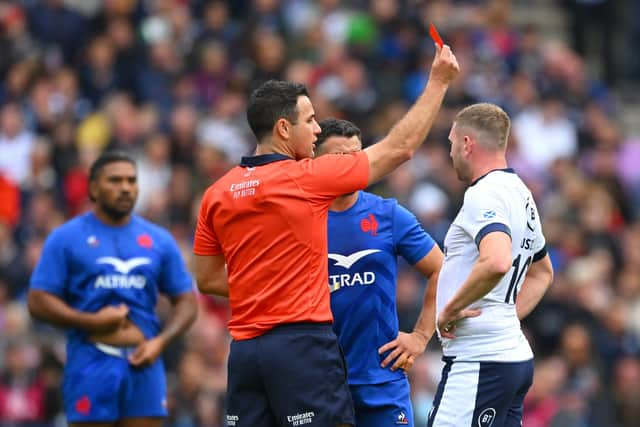Rugby law changes are to be cautiously welcomed but issue over replacements needs addressed
Rugby Union is such a complicated game that Law changes are frequent. Some of those planned to come in next season are welcome. Others under consideration await approval. This is reasonable. One thing difficult to take into account is unforeseen consequences, but the likelihood of such must be considered.
Most of us, I guess, will be pleased to see the revision to encourage the quicker release of the ball from the ruck and the end of the sight of a scrum-half hopping on one foot while with the other he daintily eases the ball out from the forwards so that he can deliver a box kick. This change might be unnecessary if the referee’s call “use it” was more than a pious plea. Still, ending the hop-hop is welcome.
Advertisement
Hide AdAdvertisement
Hide AdGetting rid of the kick-tennis rally that Finn Russell and Tomas Ramos engaged in at Murrayfield a few weeks ago would also be welcome, but since this would require a revision of the offside law, careful consideration of possible consequences is surely needed.


Then there is the matter of red cards with the suggestion that a player receiving one might he replaced by a team-mate after 20 minutes. Trials of this have been held in the Southern Hemisphere and many of us may find the proposal agreeable. “Why,” some say, “should the whole team be punished for one player’s stupidity?” That’s a silly question. Teams are often punished because of individual mistakes – a missed tackle or an overthrow at a defensive line-out for example.
Others, with more apparent reason, complain that reducing a team to fourteen men makes for an uneven match, spoiling the spectacle. Inasmuch as international rugby is now a game for spectators as well as players. This may be a fair point, though the truth is “sometimes it does, sometimes it doesn’t”. Writing in The Times this week Alex Lowe that there have been 44 red cards in Six Nations and Rugby Championship matches since 2010. “The team reduced to 14 men have won 22, drawn 3 and lost 19 of these games”.
This is persuasive but not compelling. You would have to know at what stage in the game the man was sent off and what the score was then. Circumstances alter cases.
World Rugby is eager to speed the game up. Well, some speeding up can be done without any law changes. Referees could easily get rid of one irritant. Given the number of line-outs in most matches, you get at least a couple of more ball-in-play minutes at line-out if referees stopped allowing the forwards of the team due to throw-in from holding a summit conference ten or so yards back before strolling to the line-out with one of them then coming forward to whisper in the hooker’s ear. “Time wasting – free kick to the other side” would soon stop this nonsense.
Meanwhile World Rugby has nothing to say about the matter that most interests or indeed concerns so many of us. This is the number of replacements who flood the field in the second half. Their arrival seldom improves the game as a spectacle and may even be held to spoil it because the game rarely opens up in the last quarter as it used to do as players, especially heavy forwards became tired, and more space appeared. I see why coaches like the present arrangement; bringing on replacement may be the only way they can influence the course of the game; but I doubt if many spectators like it. Six permissible replacements is surely too many. Four at most would be enough. One might indeed prefer fewer, though one appreciates that cutting the number might create its own problem. You would still – probably – be allowed to replace an injured player – so would we then have players being instructed to feign injury?
Many would like to see the matter and number of replacements being addressed. No more than two after fifty-five minutes, two more after 65? Might that be satisfactory? The sight of the Springbok “Bomb Squad”, a whole new front row, coming on about the 50th minute may be impressive, but it is not appealing. Maybe you should be allowed to bring on only one replacement at a time – with a five minute (or more) interval before another was permissible.
Perhaps… Dream on.
Comments
Want to join the conversation? Please or to comment on this article.